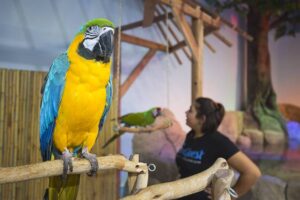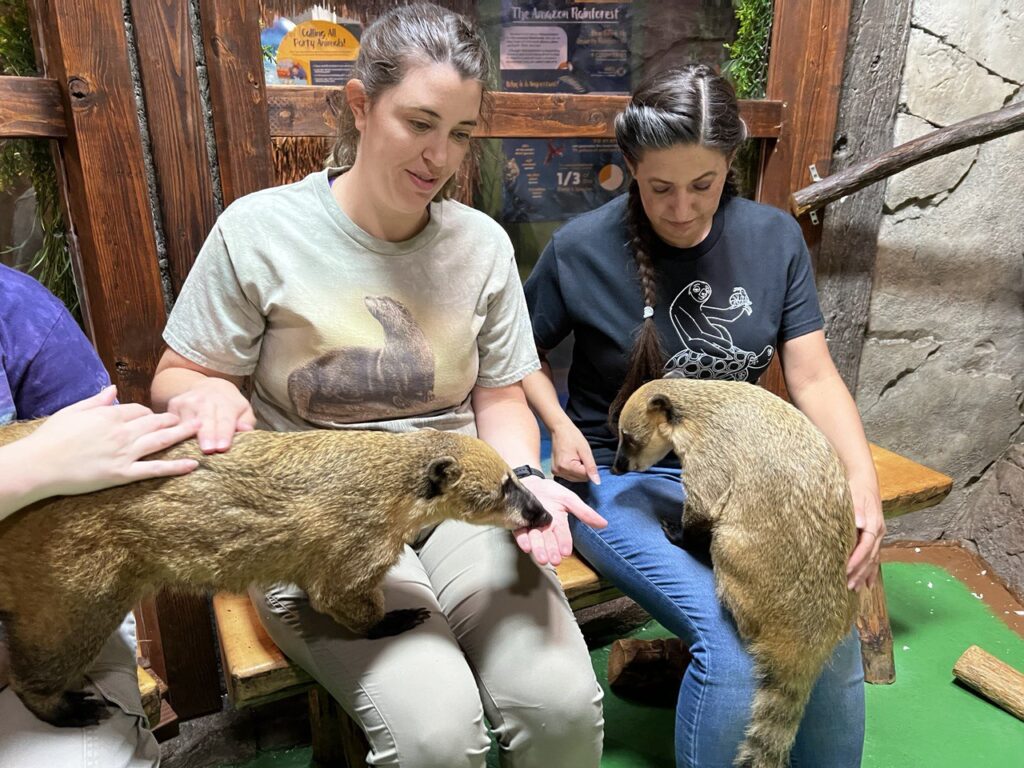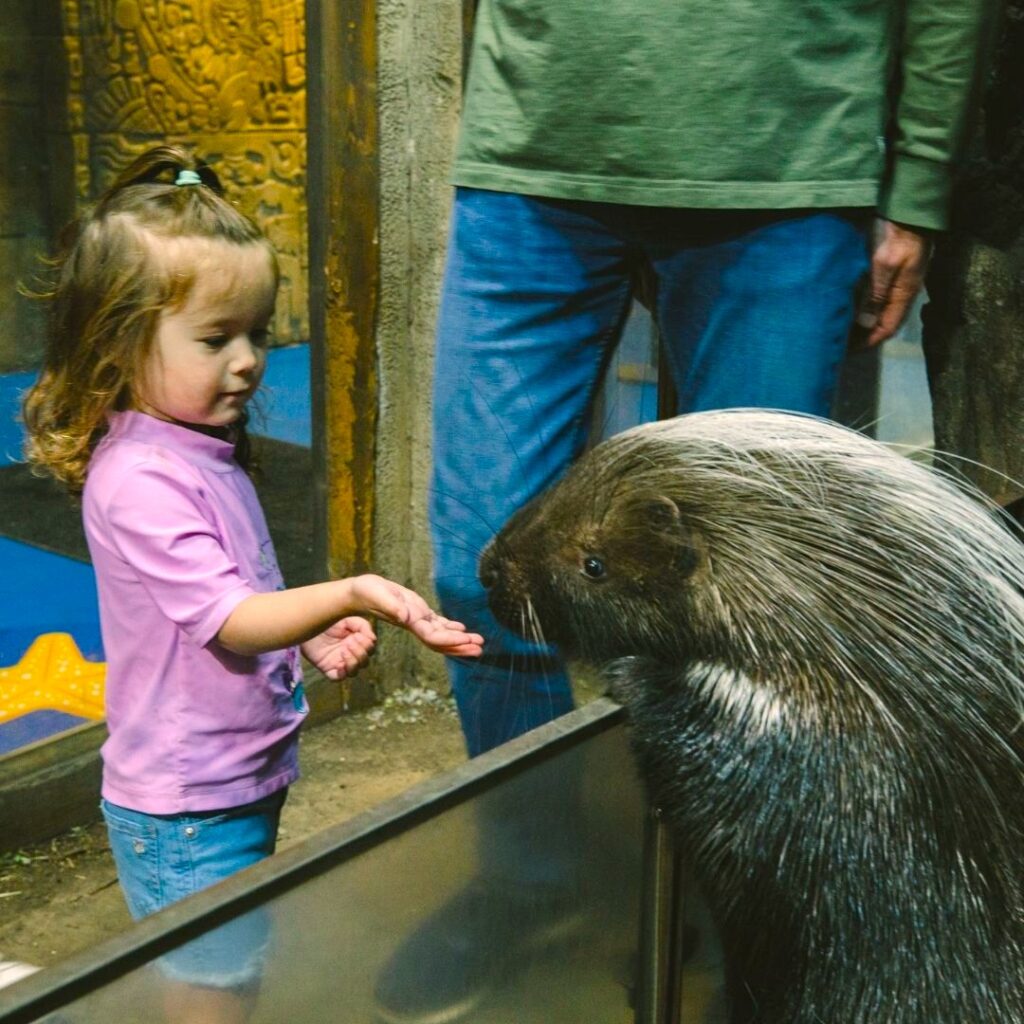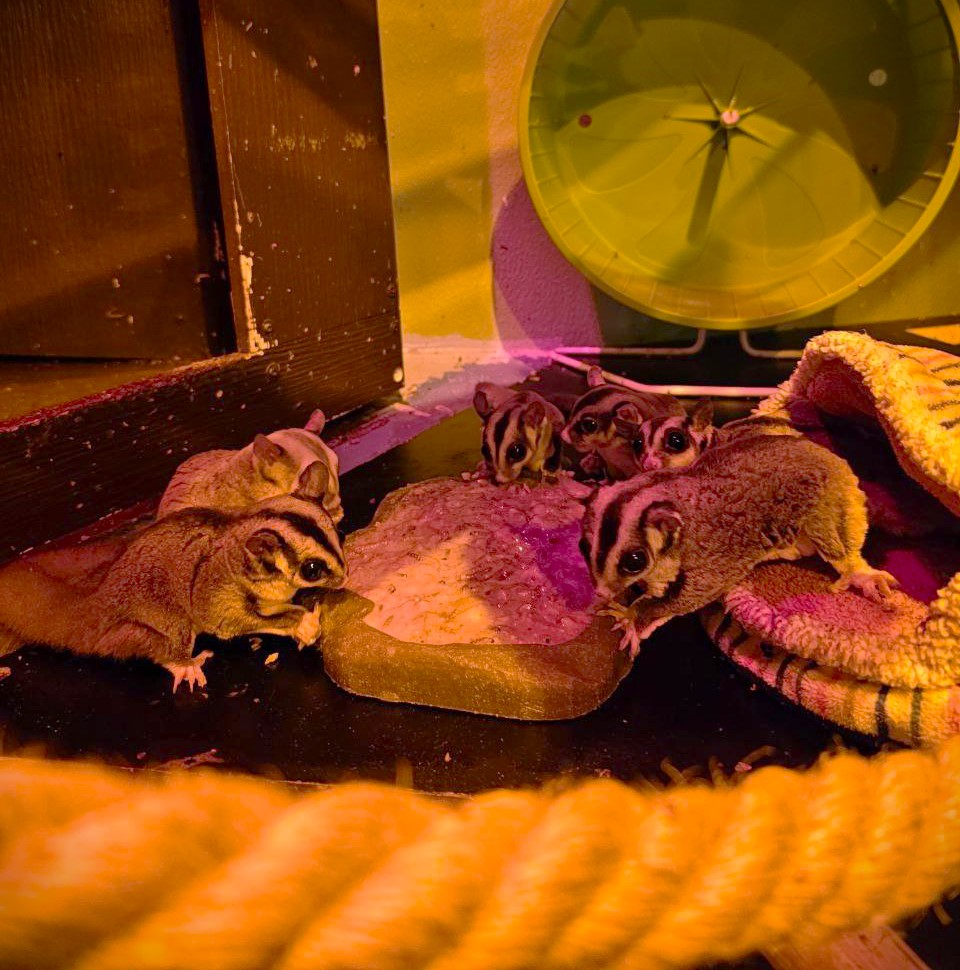Should You Keep Exotic Animals as Pets?
Share it on:

When thinking about exotic pets, such as a tiger or parrot, you may imagine a specific image. However, “exotic pet” is a broad, all-encompassing descriptor. It pertains to any animal that hasn’t been selectively bred for generations, and most are not native to the local environment. As such, it can include everything from a chinchilla to a grizzly bear. From a legal perspective, though, some states, such as Florida, define “exotic pets” based on the danger they present to the public.
Owning an exotic pet may seem luxurious and fascinating, but it can be problematic once you examine the ethical, environmental, and practical questions. Let’s examine some of these questions and why it may be best to leave exotic pets within their natural habitat or to conservation programs.
What Is an Exotic Pet?
Livestock, dogs, cats, or certain rodents are all considered domestic pets. Exotic pets, on the other hand, include:
- Amphibians: This mainly pertains to frogs, but some people also seek out salamanders, newts, axolotl, and other wildlife that are born as larvae in water and can inhabit terrestrial habitats after maturation.
- Birds: People will seek out a variety of avian wildlife, such as parrots, macaws, parakeets, cockatoos, cockatiels, toucans, and other birds of prey.
- Aquatic life: People most commonly seek out fish because they’re easier to maintain than large aquatic mammals. Jellyfish, octopus, crustaceans, starfish, seahorses, manta rays, and other foreign fish are common exotic pets.
- Mammals: This includes any animal that nurses in its infancy and hasn’t been bred for the benefit of owners. This includes certain rodents, otters, marsupials like wallabies and opossums, bears, wolves, primates, wild cats, and more.
- Reptiles: This includes snakes, iguanas, crocodiles, alligators, geckos, and lizards.
People often learn about these animals and find ways to own them without researching the damage of doing so. It may also be especially dangerous if owners don’t understand the implications of owning an endangered species.
The Prevalence of Exotic Pets in the U.S.
Owning an exotic pet has been a growing trend. According to a 2019 Association of Zoos and Aquariums (AZA) census, exotic pet ownership rose 25% from 2011 to 2016. Since many states have created regulations on exotic pet ownership since this census, it’s difficult to say how many Americans own an exotic pet in 2024. However, many still seek out exotic pet ownership despite the penalties involved.
It wasn’t always this way. Although there are countless historical records of people owning exotic pets dating back to ancient Egypt, the practice became normalized in the late 20th century. During this time, equipment for owning these animals became much more accessible to the broader public.
Since then, social media has also played a significant role in normalizing exotic animals, according to the AZA. Even if influencers have a special license for owning an exotic pet, most of their followers won’t understand and seek out ownership without a license. Social media also tends to highlight the upsides of owning an exotic pet rather than focus on the downsides. As such, many uninformed followers may jump into exotic pet ownership without understanding all the considerations.
Use Code BLOG25 for 25% OFF Any Admission Ticket
Considerations of Owning an Exotic Pet
Owning an exotic pet isn’t like owning a dog or a cat. From the legal to the environmental, there are a variety of considerations that will dissuade anyone from personally owning an exotic animal.
Ethical Considerations of Exotic Pet Ownership
Even if you aren’t considering owning an endangered exotic animal, owning exotic animals in general could endanger their welfare. Like any animal, an exotic animal is a product of its ecosystem. For example, the American gray wolf has adapted to run at least 30 miles daily, socialize with other pack members, and solve mentally complex hunting scenarios to obtain food. Most people can’t provide this environment for a gray wolf, no matter how much they want to. If you deprive an exotic animal of this experience, their mental, physical, and emotional health will decline.
Even if you provide the best possible experience for an exotic pet, obtaining one is also fraught with ethical dilemmas. Animals trapped and captured from their native environments will often die during transportation from the mere shock of it all, on top of poor living conditions. Breeders will then put the captured animals that lived through intense breeding programs without considering proper care. People who buy exotic animals born into this kind of environment are only supporting the continuation of this unethical practice.
Environmental Considerations of Exotic Pet Ownership
Once an exotic pet develops habits in a different environment, you or other conservation organizations will not be able to return it to its natural habitat again. The animal won’t be able to socialize with other members of its species and obtain food by itself since it didn’t learn these habits from a young age.
Despite this, many exotic pet owners will release their pets into their local environment once they realize how unviable ownership is. This practice directly introduces an invasive species to an environment that cannot sustain it. The most notable example of this phenomenon is the invasion of the Burmese python in the Floridian Everglades.
These 20-foot-long snakes became popular in the 1980s, and many pet owners released them into the Everglades, assuming they would survive in the environment. Survive and thrive they did — Floridian authorities estimate that tens to hundreds of thousands of pythons are responsible for decimating most prey in the area. As a result, Floridian authorities have established an open season on pythons, allowing hunters to cull the invasive species without a hunting license.
Safety Considerations on Exotic Pet Ownership
You can’t rewire centuries of evolution in a single pet, and in your attempt to domesticate an exotic pet, your safety and others around you could become forfeit. Exotic animals need more space and mental stimulation than private owners can provide. Over time, the lack of stimulation and proper care can lead to behavioral issues or attacks against owners. Pets may also try to escape and attack children and others in the community. According to a 2022 data set, exotic pets were responsible for more than 65 fatalities from 1990 to 2022 — this, of course, doesn’t include the numerous injuries that other exotic pets were responsible for.
In addition, many exotic pets present a biological danger to animals and people in the area by carrying and spreading zoonotic diseases. Notably, they can be carriers of avian influenza, salmonella, herpes-B, and monkeypox. There is also mounting evidence that zoonotic diseases are becoming more common.
Financial Considerations of Exotic Pet Ownership
Like any pet, exotic animals cost money. You must pay for a specific diet, bedding, equipment, veterinary care, and insurance. Unlike a traditional, domesticated pet, these necessary things are often more costly for exotic animals.
Your pet insurance and liability rates will also be higher wherever you live since most exotic animals can cause damage at your residence. In addition, you will have to accommodate all of these fees for the entire life of your exotic pet, which is often longer than the lives of domestic pets. For example, cockatoos can live up to 50 years, wildly contrasting with the standard parakeet, which lives up to 12 years.
Logistical Considerations of Exotic Pet Ownership
You will also need to research the proper equipment and space to provide proper care and stimulation for an exotic pet. Certain fish, for example, need a bigger tank of water to swim in than standard pet fish. Often, this equipment can be challenging to find, and you may have to look further than your local pet store.
You’ll also need to regularly clean and maintain this environment to keep your pet healthy, which can take a lot of time. Most zoos will hire teams whose entire role is cleaning animal sanctuaries around the clock. As a pet owner who likely has a full-time job to provide for a costly, exotic pet, this may be inconvenient with your schedule.
Once you obtain the right equipment, you must consider their mental enrichment and training. Some may try through training, but most private owners lack the qualifications and education to support their efforts. As a result, exotic pets will suffer. Even if you do provide plenty of training, complete domesticity is impossible. Exotic pets will also have wild habits incompatible with a private home.
Legal Considerations of Exotic Pet Ownership
Even if you disregard the considerations mentioned above, you may not be able to own an exotic pet legally, depending on the animal and the state where you live. Many states have passed legislation to protect their citizens against dangerous exotic animals, prevent the spread of zoonotic diseases, and protect animal welfare. States in the U.S. have a varied approach to exotic pet ownership in the following range:
- Comprehensive: In the U.S., 20 states have a comprehensive ban prohibiting the ownership of all non-native non-domesticated species.
- Partial: 14 states in the U.S. have a partial ban on the ownership of endangered species or species considered a danger to the public.
- Licensing regulations: 15 states require exotic pet owners to have a special license that proves their qualifications and a standard of care for the exotic animal. Exotic pet owners must also pay a fee and carry liability insurance if the exotic animal causes damage.
- No ban: Three states in the U.S. — Nevada, Alabama, and North Carolina — have no legal regulations against exotic pet ownership.
If you live in a state with a comprehensive ban and own an exotic pet, you own a prohibited exotic pet in a partial ban state, or you own an exotic pet without a license, you will face legal consequences. Often, this takes the form of a penalty fee. In some states, such as Oregon, you will be responsible for all damages of the exotic animal multiplied by the penalty fee for owning an unlawful pet
Legal Reform on Exotic Pet Ownership
While the Endangered Species Act prohibits the trade of endangered species and the Animal Welfare Act provides a standard of care for commercial organizations, no existing federal law addresses private pet ownership of all exotic animals. Instead, states have to define what exotic pets are and whether citizens are allowed to own them. Luckily, many states have at least a partial ban on pet ownership.
The only complication is that many of these states have yet to provide a comprehensive definition of an exotic pet. For example, some states only say “dangerous pets” instead of exotic pets. Consequentially, exotic pets that don’t pose a danger are permissible, even if their ownership endangers the environment and is ethically questionable. States with more comprehensive bans use more specific terminology to describe exotic pets. To support the ESA and animal welfare in general, all states in the U.S. need to emulate this practice. Either that or federal legal reform is needed to protect these animals comprehensively.
Alternatives and Solutions to Exotic Pet Ownership
It’s perfectly understandable to be intrigued by exotic pets. However, it may be better for you and exotic animals to find alternatives to ownership. Here are some options:
- Local zoos and aquariums: Most cities will either have a zoo or an aquarium that helps raise money for conservation efforts and provide a habitat for animals that can’t return to their natural environment. They may come from private ownership or have health conditions that would endanger their lives in the wild. Staff members are trained and held to a standard for animal care that the layperson may not be qualified for. You can support these efforts by visiting these organizations and feeding your curiosity for exotic pets.
- Conservation organizations: Similar to zoos and aquariums, conservation organizations benefit the conservation efforts of exotic animals. Most, if not all, of their proceeds benefit the cause. Some organizations may need a physical facility for you to visit the animals, but supporting these organizations benefits the species as a whole.
- Education initiatives: Immersive programs like the one SeaQuest provides educate the public about exotic animals without endangering their welfare through private ownership.
No matter your choice, these options can be much more convenient and enjoyable while assisting conservation efforts worldwide.
SeaQuest’s Commitment to Animal Welfare and Public Education
Although you have many options instead of pet ownership, SeaQuest, in particular, provides a valuable experience for anyone passionate about wild and marine life. Here, a trained staff provides a high standard of care for rescued exotic animals that far exceeds the care any pet owner could provide. They also teach all of their visitors about their exotic animals so that you can learn more about your favorite animals in a friendly and fascinating environment.
Check out our video on Exotic Pet Ownership and visit SeaQuest today to learn more about some of the most amazing exotic creatures on earth!







